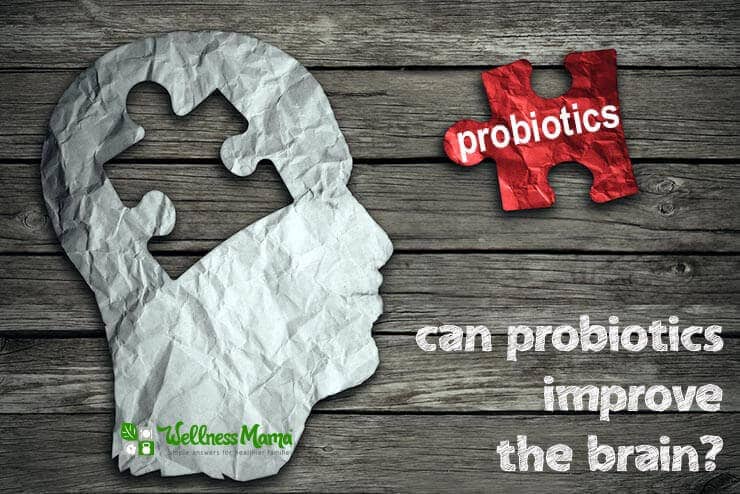Lately, we’ve been hearing a lot about probiotics in the media. Supplements are filling up pharmacy shelves, yogurt commercials can be found playing on repeat, and fermented foods like sauerkraut are finally being used in more places than atop the occasional hotdog or Rueben sandwich.
With a surge of microbiome-related research emerging in recent years, it has become common knowledge that the bacteria colonizing the gastrointestinal tract have a major impact on physical health. Now, substantial evidence is showing that the upkeep of a healthy microbial environment in the intestines is also hugely important for brain development, mood and cognition. Prebiotics are also key here.
In other words- it is entirely possible and probable that probiotics improve your brain.
The Gut-Brain Connection
In the body, single cell organisms– primarily in the form of bacteria– outnumber human cells ten to one. Over 100 trillion of these teeming microbes take up residence in the gastrointestinal (GI) tract, where they are hard at work tearing apart food to extract useful vitamins and minerals, and taking a valiant stand against dangerous pathogenic invaders when needed.
Yet in addition to their local roles in optimizing the digestive and immune systems, these little organisms have something much bigger going on: the microbes in the gut partner with the nervous system to send messages throughout the body and to the brain.
The digestive tract has deep, physiological connections to the central nervous system. After all, information relating to hunger and satiety must be exchanged between the two in order for us to survive.
The gut even has its very own set of nerve cells, or neurons, embedded in the intestinal walls. These millions of GI neurons make up a highly integrated neural network called the enteric nervous system. With as many neurons as the spinal cord, the enteric nervous system is so sophisticated and complex that some have ventured to call it the “second brain.”
The vagus nerve, nicknamed the “wandering nerve” serves as the major conduit between the enteric and central nervous systems. As the longest cranial nerve, it extends from the brain stem right down to the abdomen, allowing signals to pass freely between these locations.
Interestingly, about 90% of the fibers in this spindly nerve carry signals upwards from the bowels toward the head, and not the other way around. This orientation allows the microbes in the gut to send powerful messages that can actually steer the high-level emotional processing that occurs in the brain. (1)
Roles of Probiotic Bacteria
The idea that the microorganisms in our bellies could influence how we think and what we feel is a shocking one. To understand this gut-brain connection further, let’s look at some of the main pathways through which microbes in the gut impact the nervous system.
- Promote growth and development of neurons. Compounds produced by the microorganisms in the gut stimulate the release of neural growth factors, the proteins that encourage the formation and survival of nervous system cells. Research is now suggesting that even before birth, maternal-fetal transmission of bacteria occurs through the amniotic fluid and umbilical cord blood, stimulating early nervous tissue development. After birth, microbes from the outside environment (including those from breastmilk, foods, contact with siblings and pets, etc.) continue to enter the body and shape the nervous system throughout late childhood and even beyond. (2,3)
- Stimulate memory and learning. Certain strains of gut bacteria produce chemicals that stimulate a sympathetic, or “active” response in specific parts of the brain. Often this occurs in regions involved in decision-making, planning, and attention such as the frontal cortex and hippocampus. Bacterial metabolites are thus very important for jump starting the biochemical processes involved in memory and learning. (4)
- Guide changes in mood. Select microorganisms help to produce mood-regulating neurotransmitters like serotonin, GABA and melatonin. Over 30 different bacterially-derived neurotransmitters work locally in the tissues of the gastrointestinal tract, and also relay signals to the central nervous system. It has been suggested that almost 95% of the body’s serotonin is produced in the gut. (5)
- Shift digestive patterns. Metabolites from bacteria stimulate sensory nerves in the intestines to change gut motility patterns. Feedback from these motor changes is then relayed to the brain, where a response is elicited. Pain and anxiety are two of the most common reactions. This cross-talk is one of the reasons why psychiatric disorders are often accompanied by chronic digestive problems and vice versa. (6)
- Influence the expression of genes. It was once believed that genes were destiny. However, it is now known that many lifestyle factors have a profound influence on the ways in which genes are expressed. The study of epigenetics has revealed that microorganisms play a large part in this. Bacteria in the gut hold the potential to change patterns of DNA methylation, thus switching certain genes on or off. (7)
Can Probiotics Improve Your Brain?
These findings have raised many intriguing questions. Would altering the microbiome change predispositions to psychiatric disease?
Could probiotics be used to treat conditions such as anxiety and depression?
The short answer is a loud and enthusiastic yes, although an abundance of research will be needed before targeted clinical strategies are brought to the mainstream.
In the meantime, there are many steps that can be taken independently to fortify the gut microbiome and heal the brain.
A nutrient-dense diet filled with fermented foods is a powerful place to start, especially when Probiotics is added in.
Opting for gentle personal care products that won’t eradicate beneficial bacteria is another often-overlooked step, as is drinking pure, chemical-free water.
For those seeking more specific treatments, connecting with a functional medicine clinician or naturopathic doctor who can help develop an individualized plan is important and will be immensely helpful as well.
Do you take probiotics? Have you noticed a difference in mental clarity when taking?
 About the author: Kayla Grossman, R.N. is a registered nurse turned researcher and real food advocate who blogs at Radiant Life Catalog (my source for supplements like Vitamin C, Astaxanthin, Vitamin D and air filters, water filters, and more).
About the author: Kayla Grossman, R.N. is a registered nurse turned researcher and real food advocate who blogs at Radiant Life Catalog (my source for supplements like Vitamin C, Astaxanthin, Vitamin D and air filters, water filters, and more).



Leave a Reply